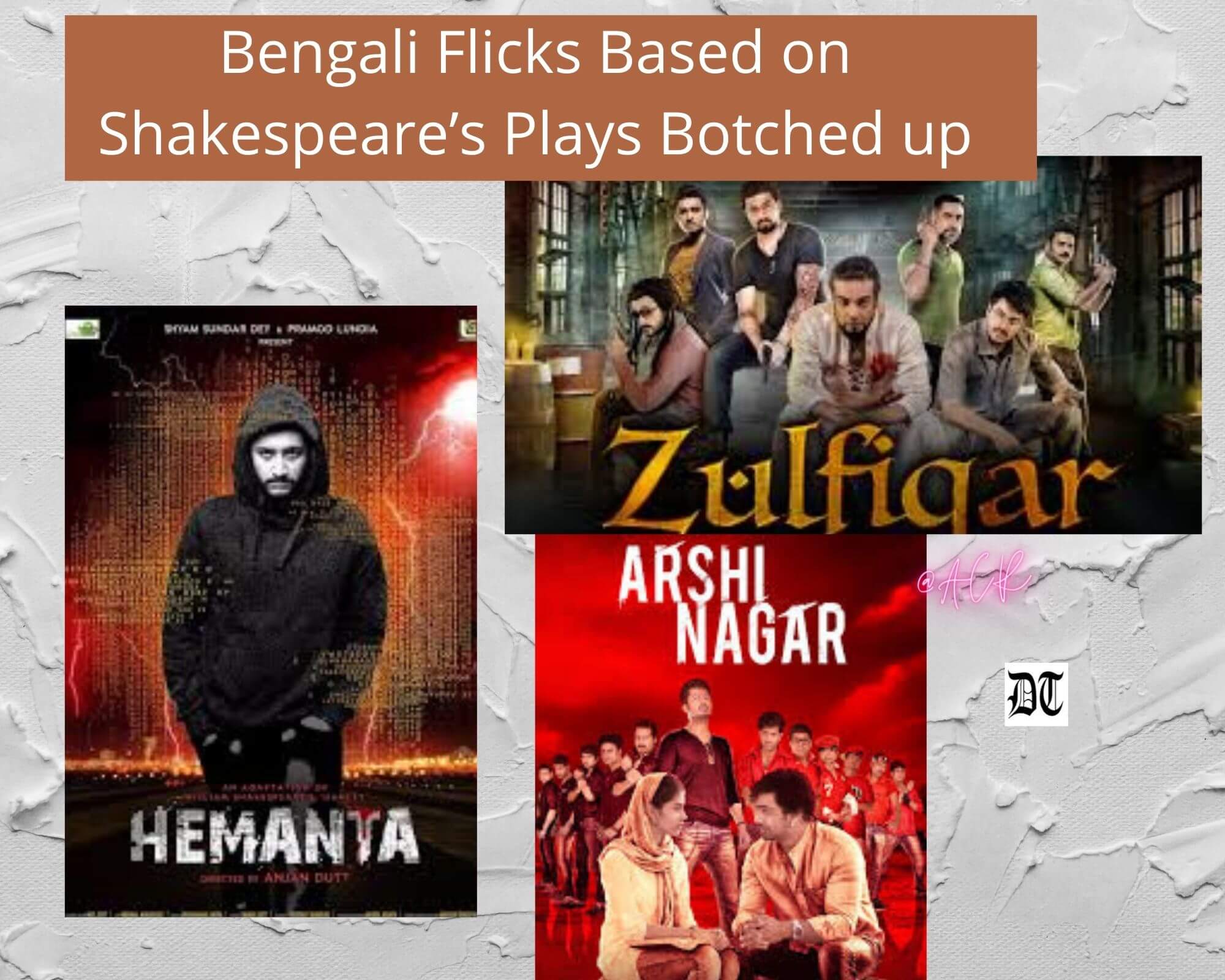Ruchira reviews some Bengali films based on and inspired by Shakespeare’s plays. These have been botched up, she opines. An exclusive for Different Truths.

More than five hundred years after Shakespeare walked into sunset, the vast treasure trove that he left behind continues to enjoy immense popularity not only in his native land but in all English-speaking nations around the globe. This includes Britain’s erstwhile colonies. And India happens to be a prominent one among them. Over the decades Indian film directors have churned out films based on the Bard’s famous plays. This applies to Bollywood and Tollywood (Kolkata) which jumped onto the bandwagon much later. Let us focus on Tollywood for now.
Noted director Srijit Mukherji’s Zulfiqaar, released in 2016, is a fusion of two well-known plays Julius Caesar and Antony & Cleopatra. The result is a sheer disaster. The classical royal ambience of imperial Rome is nowhere to be found; instead, what we have is a sleazy, grizzly atmosphere of a metropolitan underworld fraught with jealousy, treachery, adultery, betrayal and what have you. Political feuds faction machinations yield place to inter-gang rivalry and violence. Shakespeare aficionados who might be looking for some elements of poetry or elegant diction will not find any. The film garnered criticism and brickbats for portraying several Muslim characters involved in crime and other nefarious activities. As if followers of other faiths are holy cows! A slur on communal harmony. So, unless you are looking for a spicy complicated plot you can conveniently give the film a miss. Not an iota of entertainment. At least, I didn’t find any.
Noted director Srijit Mukherji’s Zulfiqaar… is a fusion of two well-known plays Julius Caesar and Antony & Cleopatra.
Singer-actor turned-director Aajan Dutta’s Hemanta, a takeoff on Shakespeare’s Hamlet is another damp squib. As it is the play is perhaps the most intellectual and philosophical one among the Bard’s creations. But the discerning viewer or audience will realise that the intellectual flavour has evaporated. Instead, they are ushered into a glamourous glitzy world of gorgeous people moving around in swanky cars and organising flamboyant parties and so forth. Denmark, the location of activities in the original play is smartly replaced by the vast sprawling premises of Agradoot Pictures a Kolkata-based production house owned by Hemanta’s late father. Later, it is taken over by his mother, a former actress, involved in a clandestine liaison with her husband’s sibling. After bumping the old man off, she ends up marrying the brother.
Last but not the least, the emotional encounter between Hamlet and his father’s ghost — the pivot point of the play— is nowhere to be found.

Distortions induced in the movie are indeed jarring. Hemanta — the wake-and-bake heir of the company — quits his study cum-on-the-job training in the US of A and returns to his roots for firefighting and saving his family’s fortunes. On her part Olypriya (Ophelia) appears sans strength of character, a damsel in distress who constantly seeks the proof of Hemanta’s love for her. Last but not the least, the emotional encounter between Hamlet and his father’s ghost — the pivot point of the play— is nowhere to be found. The insipid ending of the film is again disappointing.
Aparna Sen, the much-acclaimed director, and a feisty feminist appears to be going bonkers as age catches up with her. Why else would she churn out a bizarre flick, which people like you and me can’t make a head or tail of. Yes, I am talking about Arshingar (2015) based on the romantic tragedy Romeo and Juliet. To begin with, there was as absolutely no need to bring in a religious angle. It is the story of two star crossed lovers and their feuding families. How does faith come into the picture? I really wonder. There are other puzzling elements galore. For example, an entire gang war, is depicted via a martial dance sequence. Then comes a murky scene when a real dagger slashes a real throat at the end of the sequel.
On the other hand, quintessential Shakespearean traits e.g., rich quality of verse and rhythm…are missing from the movie.
Violence is palpable at every step throughout the film. On the other hand, quintessential Shakespearean traits e.g., rich quality of verse and rhythm, not forgetting the tender yet passionate moments between the timid innocent teenage girl and her ardent boy lover, are missing from the movie. How could Sen, an English Hons graduate herself, overlook these vital points? While watching the film you are bound to perceive a musical glut. You have the lead pair singing, the neighbourhood goons sing at the drop of a hat, a politician sings. We also get to hear celebrity crooner Parvathy Baul’s renditions each time the story takes a dramatic turn. Summing up, Arshinagar has diverse styles and features interpolated into it but in such a haphazard, chaotic fashion that the viewers are left wondering whether they have watched a Shakespearean drama, a musical or an abstract play.
Visuals by Different Truths






 By
By
 By
By
